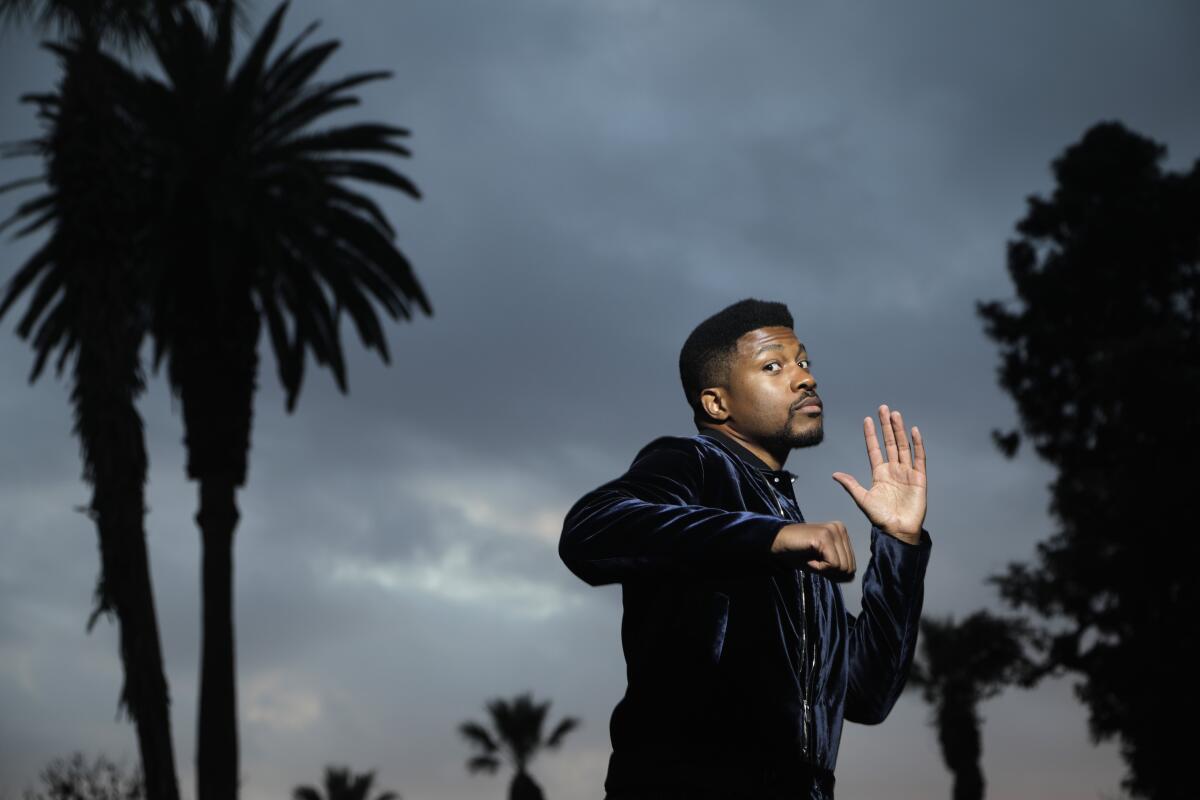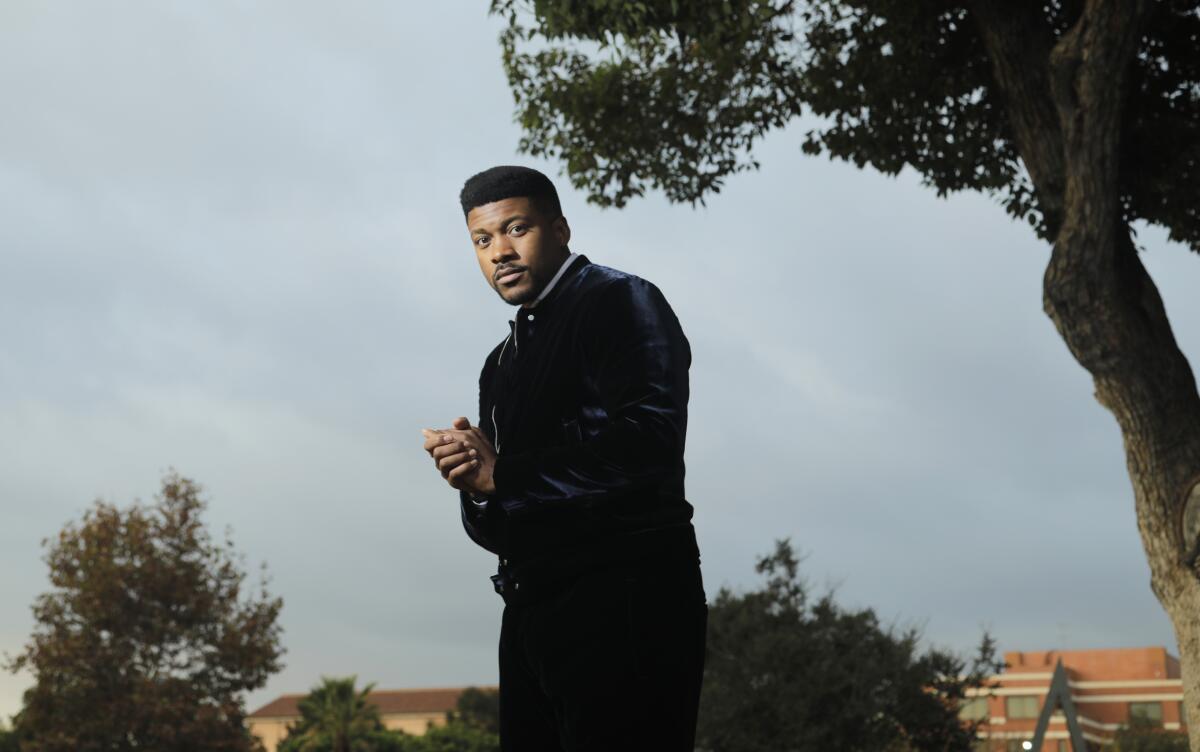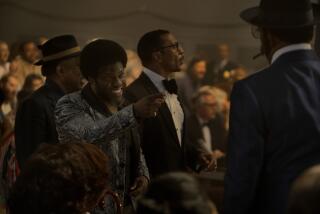Eli Goree gets into the skin of Muhammad Ali for âOne Night in Miamiâ

For two years, Eli Goree had been circling the chance to play Muhammad Ali in different projects before âOne Night in Miamiâ finally joined the part of the monumental sports figure with one supremely well-prepared Canadian actor.
Director Regina Kingâs film adaptation of Kemp Powersâ play imagines the conversation peers and pals Malcolm X (Kingsley Ben-Adir), Jim Brown (Aldis Hodge), Sam Cooke (Leslie Odom Jr.) and the newly crowned heavyweight champion Cassius Clay might have had in a hotel room in 1964 at a turning point in not just their lives, but Americaâs. âIt was just a blessing,â says Goree, who spoke recently on the details and dynamics of portraying the Greatest, particularly at that â and this â moment in time.
What was the first chance to play Ali?
I had auditioned for Ang Lee for a film he was doing about Joe Frazier. Then they told me they cast a guy out of Britain and it ended up being Kingsley! [his âMiamiâ co-star Kingsley Ben-Adir] Then the film didnât end up getting made.
Your character on the CWâs âRiverdaleâ was a boxer. Was that a fortuitous bit of actor training for this film?
The boxing I did on TV was because I was prepping to play Cassius [again]. I was going to do a play called âFetch Clay, Make Manâ about Cassius Clayâs unlikely friendship with Stepin Fetchit. They found out I boxed and wrote that into the script. Then I got a call from a friend who said Regina was casting for this.
How did you work to capture his distinctive speaking style without it coming off as just imitation?
It started with what it is to be a Black man from Louisville. Thatâs where TrĂŠ [Cotten, the filmâs dialect coach] was hugely impactful for me. Being from North Carolina, he understood what it is to be in the South: the heat, that racist environment, to always have to think before you speak. Thatâs where it starts. Then youâve got to be an athlete, youâve got to know how to talk when youâre moving, when youâre tired, when youâre fighting. Then you put on the Ali-isms. I think a lot of people try to just sound like Ali, just talk in that rhythm. Thatâs where you can get off base. If you have the right foundation, thatâs the key.
Did you limit your research on Clay/Ali to 1964 and prior?
I didnât. I just indulged in it. I watched everything. I even watched other performances. I had confidence in my ability to discard those things that were not relevant or necessary. The more information the better.

When this movie starts, who is Clay, and what is he thinking about?
What people donât realize is he was a child star from the time he was 12. He won the Golden Gloves, the nationals, the Olympics in Rome. And at the same time, heâs living under Jim Crow law. So that dichotomy of the people cheering for you are the same people who hate you is the crucible where he was formed. And that bled into his politics, into his feeling a need for brotherhood, and to join the Nation of Islam. So heâs coming into this film with all these juxtapositions, trying to figure out his path.
Youâre a Christian. Did his outspokenness about religion have an impact on you?
That was probably the biggest connection I got in this whole process. For him to have that boldness inspired me. It had me rededicate to my own faith. If this man could do that at that time, then you have no excuse not to be bold. If youâre yourself, and you love Jesus, thereâs nothing wrong with that.
What conversations did you and Regina have about this role as dramatized in this situation?
The main thing we talked about was her wanting me to make sure I captured that heâs young. Heâs 22 years old. But knowing that he was wise beyond his years, it became a real tightrope. Literally, scene by scene, moment by moment, Iâd go, âOK, here heâs just a kid having fun with his friends. But in this moment, heâs a man who understands the world more intricately and more deeply than probably most people ever will.â Thatâs why people loved him so much. He could walk two sides of the street at the same time. Thereâs a quote of him saying white people are devils, and white people loved him.
You shot the film before summerâs outpouring of protests against racial injustice. What was it like knowing this movie was in the can, awaiting release?
It was surreal. It was heartbreaking to see the world hasnât changed more, that some of the same things they were talking about 50, 60 years ago are literally happening today. I know everything happens for a reason, and it was definitely the time and place for this film.
More to Read
From the Oscars to the Emmys.
Get the Envelope newsletter for exclusive awards season coverage, behind-the-scenes stories from the Envelope podcast and columnist Glenn Whippâs must-read analysis.
You may occasionally receive promotional content from the Los Angeles Times.










